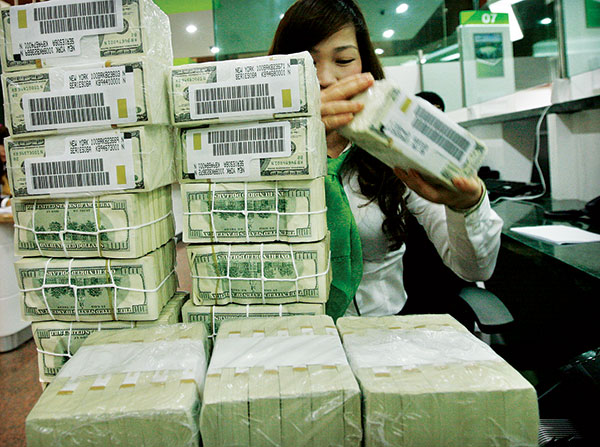Forex stability remains key to ensuring sustainable growth

At a year-end banking sector conference last week, the prime minister asked the State Bank to maintain the dong’s exchange rate within a 1-2 per cent band during 2014.
This contrasted with some earlier forecasts that suggested the dong might face major devaluation. The state-owned BIDV’s research centre, for instance, had predicted the dong would undergo a 2-4 per cent devaluation in 2014. The National Financial Supervisory Commission (NFSC) also said that the exchange rate should be more flexible to support the competitiveness of Vietnamese exports.
“The agencies which predicted fluctuations in the exchange rate should have a serious look at themselves. Their predictions caused instability,” PM Dung claimed.
Dung also required the country’s foreign exchange reserves to be increased and emphasised the need to tightly control the gold market in order to minimise effects on the forex market, interest rates and macro stability.
The PM reiterated that the State Bank should continue to hold a monopoly in the international trade of gold. Banks were no longer entitled to accept gold deposits or lend in gold, and the State Bank was being encouraged to attract home savings in gold to be deposited into the country’s official banking sector.
The State Bank successfully maintained forex exchange rate stability within a band of 2-3 per cent during the last two years and marginally devalued the dong by 1 per cent in June this year from VND20,828 to VND21,036 per dollar.
Both HSBC and ANZ in their reports released in October 2013 predicted the exchange rate in 2014 would be VND21,500 per dollar.
The stable forex market helped reduce the proportion of foreign currency deposits in the country’s total means of payment to 12 per cent in 2013 from 12.36 per cent in 2012 and 15.8 per cent in 2011. Foreign currency reserves in 2013 also doubled compared to 2011, according to State Bank figures.
Economist Vu Dinh Anh supported forex stability. “There were calls for further devaluation of the dong to support exports. But such a move might fuel inflation while helping exports only a little bit,” he said.
“A major devaluation of the dong could spark a run on the currency, which is why the State Bank has used stability and flexibility as the basis for controlling the forex market in recent years. The stability of the forex market has already raised confidence in the dong among domestic and foreign invested firms, helping them set longer-term business plans,” said Anh
Banking expert Nguyen Dac Hung said that the stable exchange rate had positively affected Vietnam’s overseas and public debts. Hung said with a 3-4 per cent devaluation, Vietnam’s debts in domestic currency would increase by tens of trillions dong.
According to Hung, a stable forex market had created conditions for the State Bank to buy a huge amount of foreign currency. Total forex reserves in 2013 were estimated at $30 billion, much higher than the $22 billion recorded in 2012 and higher than the internationally-recognised safety level of 12 weeks of import value.
The prime minister also insisted that the banking system continue to focus on controlling inflation, and that the governor of the State Bank needed to take responsibility for the issue. The bank also needed to retain stable interest rates and calculate the total means of payment and credit growth in relation to the government’s inflation target.
“Many enterprises are facing difficulties. Most of their capital is in the form of bank loans so interest rates need to maintain stable,” the PM reiterated.
What the stars mean:
★ Poor ★ ★ Promising ★★★ Good ★★★★ Very good ★★★★★ Exceptional
Latest News
More News
- Cashless payments hit 28 times GDP in 2025 (February 04, 2026 | 18:09)
- SSIAM and DBJ launch Japan Vietnam Capital Fund (February 04, 2026 | 15:57)
- Banks target stronger profits, credit growth in 2026 (February 04, 2026 | 15:43)
- Vietnam on path to investment-grade rating (February 03, 2026 | 13:07)
- Consumer finance sector posts sharp profit growth (February 03, 2026 | 13:05)
- Insurance market building the next chapter of protection (February 02, 2026 | 11:16)
- NAB Innovation Centre underscores Vietnam’s appeal for tech investment (January 30, 2026 | 11:16)
- Vietnam strengthens public debt management with World Bank and IMF (January 30, 2026 | 11:00)
- Corporate bond market poised for stronger growth cycle (January 28, 2026 | 17:13)
- Vietnam's IPO market on recovery trajectory (January 28, 2026 | 17:04)
















 Mobile Version
Mobile Version